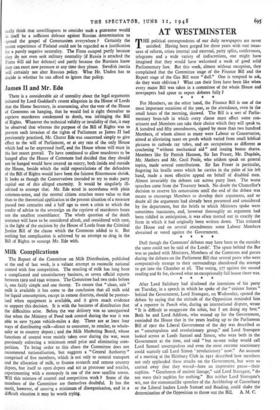AT WESTMINSTER
THE political correspondents of our daily newspapers are never satisfied. Having been gorged for three years with vast meas- ures of reform, crises internal and external, party splits, conferences, telegrams and a wide variety of indiscretions, one might have imagined that they would have welcomed a week of good solid Parliamentary fare. But this week, almost without exception, they complained that the Committee stage of the Finance Bill and the Report stage of the Gas Bill were " dull." One is tempted to ask, do they want oblivion ? What can their lives have been like when every major Bill was taken in a committee of the whole House and newspapers had space to report debates fully ?
* * * * For Members, on the other hand, the Finance Bill is one of the most important occasions of the year, as the attendance, even in the small hours of the morning, showed. The Bill is a sort of Parlia- mentary bran-tub in which every clause must affect some con- stituent and Members can take their choice which they will speak to. A hundred and fifty amendments, signed by more than two hundred Members, of whom almost as many were Labour as Conservative, aimed at alleviating taxes on goods which varied from small biblical pictures to cathode ray tubes, and on occupations as different as crocheting " without mechanical aid " and issuing bonus shares. Members like Sir Patrick Hannon, Sir Ian Fraser, Mr. Dugdalc, Mr. Mathers and Mr. Cecil Poole, who seldom speak on general topics, made several contributions. Sir Ian Fraser in particular, fingering his braille notes which he carries in the palm of his left hand, made a most effective appeal on behalf of disabled men. Almost invariably the debates cut across party lines. The worst speeches came from the Treasury bench. No doubt the Chancellor's decision to reserve his concessions until the end of the debate was meant to encourage Members to develop their arguments, and no doubt all the arguments had already been presented and considered by the department, but the briefs to which Ministers spoke were sometimes inaccurate, and, however thoroughly an argument had been riddled in anticipation, it was often trotted out in exactly the form in which it had originally been written down. This irritated the House and on several amendments some Labour Members abstained or voted against the Government. * * * * Dull though the Commons' debates may have been to the outside' the same could not be said of the Lords'. The space behind the Bar was so packed with Ministers, Members of the Commons and guests during the debates on the Parliament Bill that several peers who were comparatively strange to their surroundings abandoned the attempt to get into the Chamber at all. The voting, 177 against the second reading and 81 for, showed what an exceptionally full house there was. * * * * After Lord Salisbury had disclosed the intentions of his party on Tuesday, in a speech in which he spoke of the " sinister forces " behind the Government, Lord Stansgate, on Wednesday, opened the debate by saying that the attitude of the Opposition reminded him of a reporter in Punch who, during an international dispute, wrote " It is difficult to exaggerate the crisis, but I am doing my best." Both he and Lord Addison, who wound up for the Government, reminded the House that in the years leading up to the Parliament Bill of 1911 the Liberal Government of the day was described as an " unscrupulous and revolutionary group," and Lord Stansgate looked across at Lords Samuel and Simon, who were both in the Government at the time, and said " but no-one today would call Lord Samuel unscrupulous and even the most extreme reactionary could scarcely call Lord Simon ' revolutionary ' now." An account of a meeting at the Halsbury Club in 1911 described how members not only applauded these attacks on the Government, but were so carried away that they waved—here an impressive pause—their napkins. "Gentlemen of ancient lineage," said Lord Stansgate, "do not wave their napkins for nothing." But neither Lord Stansgate's wit, nor the statesmanlike speeches of the Archbishop of Canterbury or the Liberal leaders Lords Samuel and Reading, could shake the
determination of the Opposition to throw out the Bill. A. M. C.






























 Previous page
Previous page